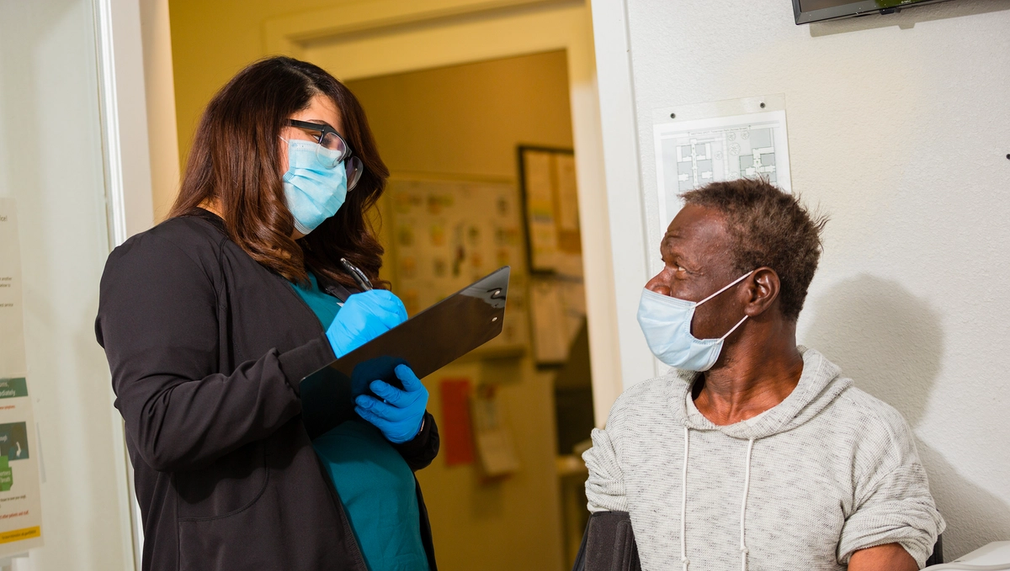An Innovative Model for Caring for Our Aging Homeless
NHF is launching an innovative148 bed interim housing facility that will be uniquely designed for older adults (ages 55+) who have experienced homelessness. Through its trauma-informed model of care, NHF and its partners will provide medical support and social services for its guests that are built on a foundation of trust and care, with the goal of transitioning our neighbors into permanent housing. The facility will also serve as a hub for community engagement, providing social services and medical support to low-income residents in the area.

What is the primary issue area that your application will impact?
Housing and Homelessness
In which areas of Los Angeles will you be directly working?
San Fernando Valley
In what stage of innovation is this project, program, or initiative?
Applying a proven model or solution to a new issue or sector (e.g., using a job recruiting software or strategy to match clients to supportive housing sites, applying demonstrated strategies from advocating for college affordability to advocating for housing affordability and homelessness, etc.)
What is your understanding of the issue that you are seeking to address?
The older adult population is the fastest growing segment of the homeless population in Los Angeles County. According to the LA Homeless Services Authority (LAHSA), there are 15,000 unsheltered older adults on the streets of Los Angeles, a number that is expected to triple by 2030. Black and Latinx older adults are disproportionately represented among those aging on the streets. Older adults face complex health challenges and have medical ages that exceed their biological ages by 20 years. They often face accessibility challenges and have difficulty performing activities of daily living, making it difficult to to manage on the street or in traditional shelters. The existing "one-size-fits-all" approach to shelter and interim housing will only exacerbate this problem, as more older adults end up on the street. Also, few, if any interim housing facilities have dedicated programs that provide preventative social and medical services to low-income, under-resourced neighbors in the area.
Describe the project, program, or initiative this grant will support to address the issue.
At its recuperative care/medical respite program in Arleta, NHF will be adapting its trauma-informed model of care to the specialized needs of older adults experiencing homelessness, who have complex health conditions, and age 20 years more rapidly than their sheltered peers. No other recuperative care facility in Los Angeles County is serving this population of older adults in the tailored way needed, and this has led to an increased likelihood of re-hospitalization, recidivism, incarceration, or returning to the streets. NHF’s 48,000 square foot, 72 room facility will provide interim housing and recuperative care to 148 older adults who have experienced homelessness, until they transition into permanent housing. Services will include medical oversight, medication management, health education, nutritional programs, and counseling. Through NHF’s partnerships with hospitals and clinics, the facility will also provide on-site medical care, including daily vitals and temperature checks, vision and dental clinics, and other medical-model components that will be specifically designed for the needs of an estimated total of 300 older adults per year who will be staying at the facility, and low-income older adults in the area who also need access to medical care and social services. This facility will also serve as a community hub to encourage interaction between the neighborhood and guests staying at the facility through community events, walking paths, and a community garden.
Describe how Los Angeles County will be different if your work is successful.
There are currently no recuperative care facilities in Los Angeles County that are designed specifically for the specialized needs of older adults who have experienced homelessness. The current one-size-fits-all model has led to older adults returning to the streets or the hospital because they are not receiving the medical oversight they need in a trauma-informed model that is tailored to the unique and complex experiences of older adults. NHF's interim housing and recuperative care facility in Arleta will provide a space where these older adults can get the specialized support and care they need. Based on the Los Angeles Homeless Services Authority's Homeless Count in 2020, the facility will effectively end homelessness for older adults in Council District 6 within the first 18 months of operation. Last but not least, this facility has the potential of serving as a model of care for unsheltered older adults that can be replicated in other parts of Los Angeles County.
What evidence do you have that this project, program, or initiative is or will be successful, and how will you define and measure success?
Funding for the renovation of the interim housing facility has been approved by the City of Los Angeles and it is expected to launch in January 2023. NHF will define success as it does in its other recuperative care facilities: the provision of trauma-informed care that increases the well-being of guests within the facility and their ability to transition to permanent housing. We will measure this success with qualitative and quantitative indicators such as but not limited to: - Stabilization in the number of unhoused seniors in Council District 6 through official statistics such as the LAHSA Homeless Count. - Percentage of guests moving to permanent housing, measured through discharge records. - Improved health and well-being, measured through tracking of health data, such as daily vitals. - Number of community residents coming to facility for social services and medical care. - Guest feedback through anonymous survey kiosks placed throughout the facility.
Approximately how many people will be impacted by this project, program, or initiative?
Direct Impact: 300
Indirect Impact: 1,000